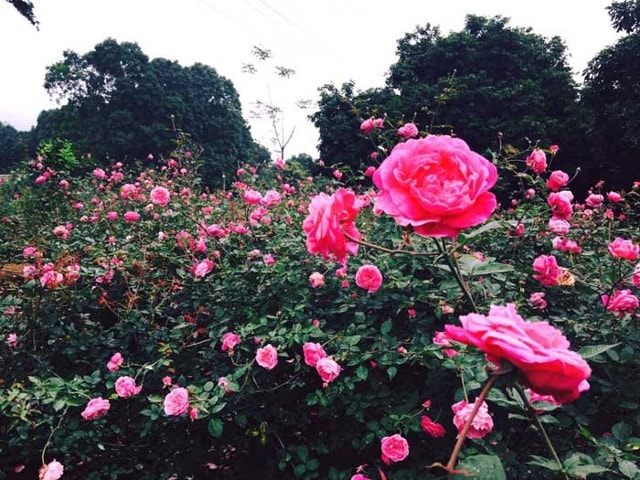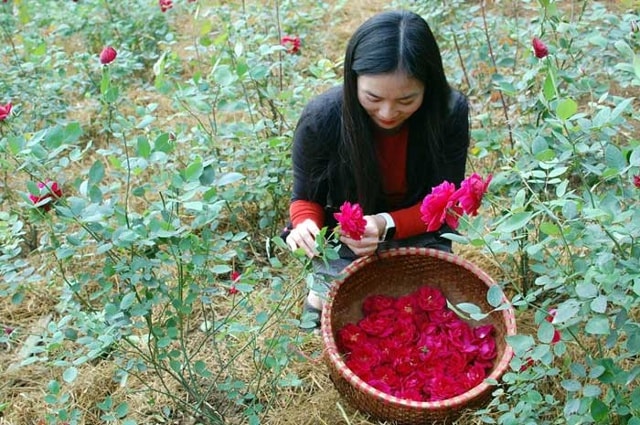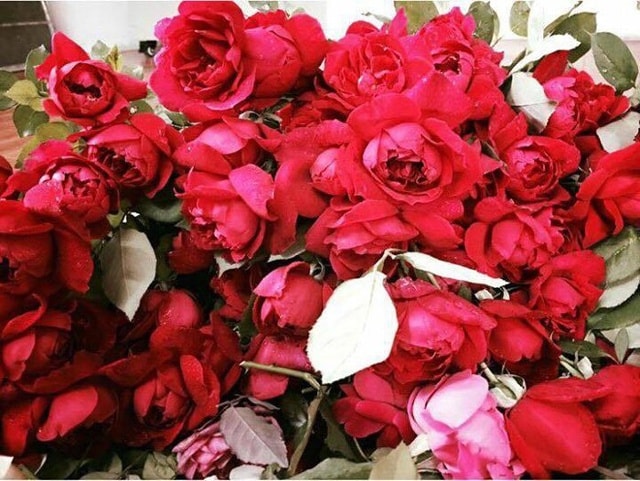8X earns billions thanks to growing...clean flowers
While satisfying her passion for roses, Ms. Hang Karose can also earn a decent income by selling products made from roses grown in her garden.
 |
| Roses are blooming in the rose garden of Ms. Hang Karose. |
People grow clean vegetables, we grow clean flowers.
After taking us on a tour of the vast rose garden on the hill, Ms. Hang Karose (Bui Thi Thanh Hang - born in 1980) in Xuan Mai (Chuong My, Hanoi) stopped, reached out to pick some bright red velvet roses and gave them to us, saying: "Velvet roses are a native rose variety with the most fragrant scent. In particular, these are natural roses, 100% clean, so you can smell them comfortably without worrying about toxicity. If you like, you can even pluck the petals and eat them right in the garden."
Ms. Hang shared that most people think that clean agriculture is growing clean vegetables, raising clean pigs, raising clean chickens,... but for her, she immediately thought of growing clean roses, because she has loved roses since she was a child.
She confided that she has a passion for natural agriculture and enjoys collecting and preserving native plants and animals. She said that if chemical fertilizers and pesticides are used, the toxic substances will gradually seep into the groundwater, causing pollution, hardening the soil and losing the purity of the garden. The garden owner and workers will be the first to be affected, followed by their customers.
“Thinking so, I decided to grow roses naturally, resolutely saying no to chemical fertilizers and pesticides.” The flowers are fertilized with composted manure and covered with straw to create humus for the soil. Indeed, each layer of loose, black, fertile soil can be clearly felt under our feet.
She said that she controlled pests by diversifying the types of plants in the garden, avoiding monoculture to create a balance in the natural garden as well as using natural products such as soapberry, garlic wine... to repel them. The water used to irrigate the plants is also well water, not surface water from ponds or lakes.
 |
| Every day she collects about 10kg of rose petals, sometimes up to 20kg if the flowers are in full bloom. |
In particular, around each garden, she organizes fences and creates buffer zones (abandoned land) to avoid cross-contamination from neighboring gardens (this is a mandatory condition of organic growing methods).
Thanks to being planted and cared for naturally, her flower garden is always in full bloom, with fragrance spreading and bees and butterflies flying around.
Earn billions from rose garden
Ms. Hang confided that since she was a child, her family had planted a garden of several hundred roses. However, as the flower garden grew larger and she wanted to start a business from flowers, she was hesitant because growing flowers for sale would not bring high economic efficiency.
"I wanted to do something to add value to agriculture, specifically to the roses I grow," she said. While she was wondering what to do, a friend suggested she try distilling rose water for skin care.
 |
| Every day, Ms. Hang collects about 10 kg of roses. |
“After learning more, I found that foreign rose water products are quite expensive, while the native roses I grow in my garden can completely make similar products,” she said.
She said that she read foreign documents that said red roses are the most suitable flower for skin care, even better than the famous Damask rose from Bulgaria (which only produces high levels of essential oils). Since then, she has become more confident with the native rose variety she chose.
From that idea, for the past two years, she has focused on developing a rose garden, devoting all her free time and passion to creating products from natural roses grown in the garden.
During the trial distillation phase, she had to try it over and over again. For example, different rose varieties will give off different scents when distilled, different cooking methods will give off different scents, different picking times will also give off different scents,...
After trying again and again, she found for herself the most satisfactory standard formula that made many customers "addicted".
She took the rose water sample to many places for testing and received the same result: her rose water was completely free of heavy metals and pesticide residues, and was not contaminated with fungi or harmful microorganisms. The product was 100% pure, without alcohol or any additives or preservatives.
Her production facility is also certified by the Hanoi Department of Health as a facility qualified to produce cosmetics.
Having succeeded with the rose water product, she continued to make dried rose petals (which can be drunk as tea). This product can help users dispel the worry of using fake flower tea products on the market.
On average, she collects about 10 kg of fresh roses (with the stems removed and only the petals intact) every day. During the peak flowering season, she collects about 20 kg per day. Flowers are grown using natural methods, so the products made depend entirely on the quantity of flowers, whether they are in full bloom or dormant. Every month, she sells about 2,000 bottles of rose water to the market, earning a revenue of up to 250 million VND per month.
According to Vietnamnet
| RELATED NEWS |
|---|

